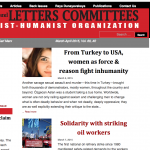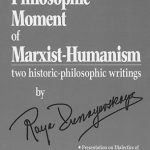Excerpts from the Introduction to the new pamphlet on ‘What Is Socialism?’


Excerpts from the Introduction to the new pamphlet on ‘What Is Socialism?’
Prisoner and hunger striker Faruq looks at the way forward after the historic California prisoners’ hunger strike and emphasizes the importance of “the banner of our humanism that allowed the forging of a tremendous unification across the racial divides.”

Spelling out the philosophical breakthrough on Hegel’s Absolutes as the total uprooting of the old and the creation of new human relations, in concrete relationship to struggles for freedom in practice and in theory, is at the heart of projecting Marxist-Humanism, and therefore of its organizational life.

Raya Dunayevskaya’s May 20, 1953, letter is one of the historic-philosophic writings included in The Philosophic Moment of Marxist-Humanism.

Raya Dunayevskaya’s May 12, 1953, letter—presented in two parts, beginning in the previous issue—is one of the historic-philosophic writings included in The Philosophic Moment of Marxist-Humanism.
From the Writings of Raya Dunayevskaya
From the May-June 2012 issue of News & Letters.
Editor’s Note: “On political divides and philosophic new beginnings,” written 25 years ago, is the last writing of Raya Dunayevskaya, who died on June 9, 1987. It was first published in the In Memoriam special issue of News & [=>]

Raya Dunayevskaya’s May 12, 1953, letter—presented in two parts, here and in the next issue—is one of the historic-philosophic writings included in The Philosophic Moment of Marxist-Humanism
Essay
by Ron Kelch
All revolutions, in the sciences no less than in general history, originate only in this, that the spirit of man, for the understanding and comprehension of himself, for the possessing of himself, has now altered his categories, uniting himself in a truer, deeper, more intrinsic relation with himself.
–Hegel
Today’s global search for a new [=>]
From the Writings of Raya Dunayevskaya
Editor’s note: On the 50th anniversary of the Cuban Missile Crisis, we present Raya Dunayevskaya’s analysis of how it tested not only the rulers’ rash folly but the anti-war movement’s short-mindedness–a lesson still urgent today. She wrote this piece as a Political Letter on Oct. 25, 1962, titled “Marxist-Humanism vs. [=>]
From the May-June 2012 issue of News & Letters:
Draft for Marxist-Humanist Perspectives, 2012-2013
(continued from Part III)
IV. Marx’s Humanism today
“The commodity form of the products of labor became a fetish because of the perverse relationship of subject to object–of living labor to dead capital. Relations between men appear as the relation between things because [=>]
Philosophic dialogue
It was good to have Ron Kelch’s Essay, “Absolute Negativity, Occupy and Situationists,” in the Jan.-Feb. News & Letters open an overdue philosophic dialogue. As someone who discovered the work of Guy Debord and Raya Dunayevskaya at about the same time, I’ve given a lot of thought to their relation.
I consider Debord’s work, especially [=>]
Essay
by Eugene Walker
István Mészáros, Social Structure and Forms of Consciousness. Volume I, The Social Determination of Method. New York: Monthly Review Press, 2010.
Global depression conditions have once again brought to the fore capitalism’s grave contradictions, and with it, new interest in the work of Karl Marx. This is not alone a theoretical question. The massive protests in [=>]
OFFICIAL CALL FOR CONVENTION
to Work Out Marxist-Humanist Perspectives for 2012-2013
February 26, 2012
To All Members of News and Letters Committees
Dear Friends:
Where we must begin is with the world in upheaval, from Occupy Wall Street to Arab Spring, still going after more than a year.
Nothing better shows the old order’s bloody desperation to prevent a [=>]
Essay
by Ron Kelch
[Absolute negativity] is the simple point of the negative relation to self, the innermost source of all activity, of all animate and spiritual self-movement, the dialectical soul that everything true possesses and through which alone it is true; for on this subjectivity alone rests the sublating of the opposition between concept and reality. –Hegel on second negation in [=>]
Lead
Protests began in September in Wukan, a village of 20,000 people in Guangdong province on the South China Sea, against seizure of more than 100 acres of Wukan’s common land to be sold to those with insider ties to the village Communist Party leadership. Village authorities escalated the conflict by identifying protest leaders and hauling [=>]